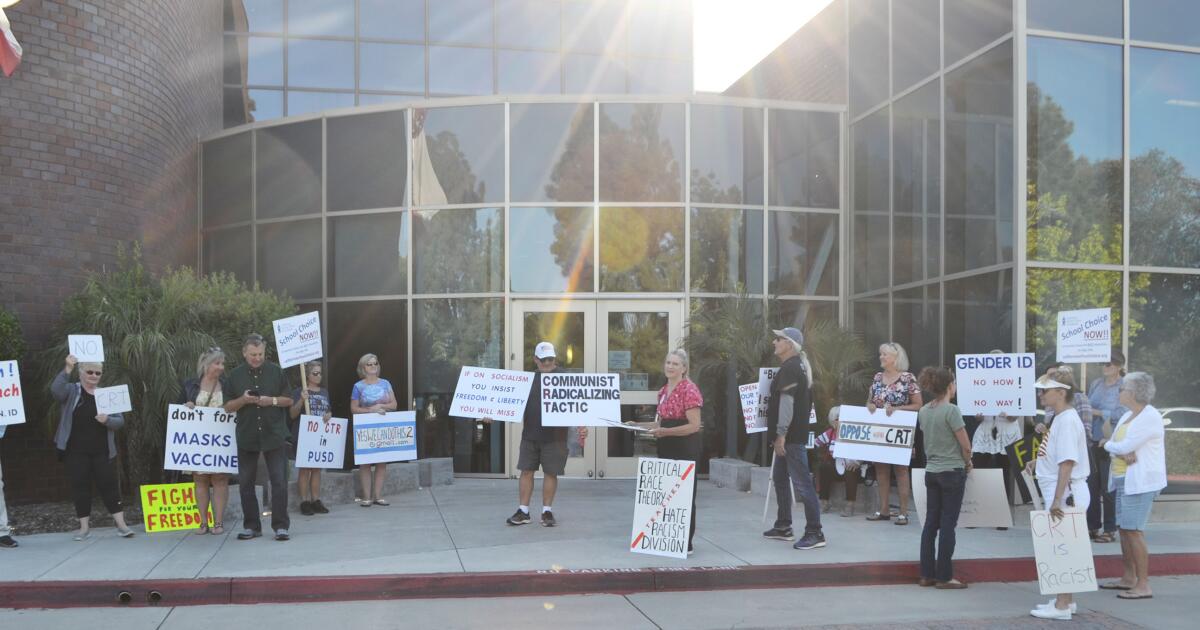States
Controversy Over Anti-Critical Race Theory Measures Rocks California Schools

California schools are wrestling with the controversial effects of initiatives to limit classroom conversations about race and racism amid a nationwide surge of anti-Critical Race Theory (CRT) attitudes. These laws may affect educational discourse and inclusion in the state’s typically liberal terrain, sparking ideological disputes.
California’s education system has been impacted by conservative groups countrywide who want to restrict CRT, causing school district disputes and disagreements. In a stunning turn of events, Placentia-Yorba Linda Unified, Visalia Unified, and Newport-Mesa Unified have experienced considerable opposition to critical race theory bans.
These initiatives have affected classroom dynamics and teacher morale beyond policy talks. Several instructors worry about distrust and academic freedom loss. With heightened scrutiny and worry, instructors’ careful attitude indicates self-censorship due to fear of penalties.
The debate’s contentiousness has heightened local tensions, with backers and opponents of the legislation disagreeing on how education should confront past injustices. Community members, civil rights groups, and educators have stressed the significance of a more thorough history to avoid maintaining a sanitized and incomplete narrative that ignores the intricacies of U.S. racial discrimination.
Despite obstacles, inclusive education and historical accuracy remain top priorities. Educators and advocacy organizations continue to advocate for a more nuanced approach to teaching to foster critical thinking and empathy in pupils.
As the dispute continues, California must decide between historical truth, inclusive education, and academic freedom. With lobbying activities and legal challenges, this intense discussion may change state educational discourse.
California School Anti-critical Race Theory Measures: Controversial Spread
In recent years, California, a liberal state, has slowly adopted anti-Critical Race Theory (CRT) education policies. Despite its blue political environment, the controversy over teaching race and racism has spread to red regions, raising worries about educators’ free expression. The conservative movement has submitted roughly 563 proposals between 2021 and 2022, with 241 of them becoming legislation to limit race and racism discussions in schools.
The progressive state of California has seen school districts like Placentia-Yorba Linda Unified, Visalia Unified, Paso Robles Joint Unified, Temecula Valley Unified, Ramona Unified, and Newport-Mesa Unified limit race-related instruction. The debate centers on the misunderstanding of critical race theory, which is primarily used in higher education and not in K-12. Despite its rarity, the hypothesis has sparked legislative efforts to silence discussions of previous racial atrocities.
California Classrooms’ Ideological Conflict And Free Speech Concerns
Conservative organizations like Reform California want critical race theory banned in California classrooms, claiming worries about brainwashing. Thus, school boards have passed resolutions mimicking the 2020 executive order made by former President Donald Trump, which banned contentious diversity training. These policies, some of which have been greeted with educator and union objections, highlight the need for balanced viewpoints in U.S.U.S. history education to prevent making pupils feel guilty or uncomfortable based on race or gender. Critics say such restrictions risk constraining teachers’ intellectual independence, resulting in a weakened curriculum that fails to address historical and present racial concerns. This has raised questions about educators’ role in encouraging critical thinking and nuanced knowledge in the classroom, with some concerned about a culture that undervalues their contributions and expertise.
Read Also: Melanie Benjamin’s New Novel ‘California Golden’ Explores Racism And Surfing Culture
Advocacy And Legal Issues In The Anti-crt Movement
Due to the increased limits on race and racism conversations, groups like the California Teachers Association and the ACLU have taken proactive initiatives to combat the effects of anti-CRT regulations. The California Teachers Association advises educators to reject critical race theory in favor of a more holistic approach to education that addresses racial concerns. The ACLU has aggressively pursued legal action, saying that these policies violate students’ First Amendment rights and create confusion for instructors and pupils. They believe school content restriction should help scholarly investigation of controversial topics. Advocacy groups aim to teach history accurately and prioritize inclusive policies.
Effect On Classroom Dynamics And Teacher Morale
Anti-CRT initiatives have changed California classroom relationships and content. The chilling effect has caused teachers to self-censor and avoid heated talks due to fears about penalties. This culture of increased scrutiny has created distrust among instructors, who feel examined for their materials and subjects. Newport Harbor High School science teacher John Brazelton said that the present atmosphere has eroded faith in teachers. Due to the increasing attention to ideological effects, teachers may hesitate to provide nuanced and sophisticated conversations, preventing students from critically examining complex but vital subjects.
Divided Public Discourse And Community Response
California communities have been divided by critical race theory disputes in schools and elsewhere. Some aspects of the community support advocacy organizations like Reform California, which promote a fairer education system within their ideological framework. Community residents, educators, and civil rights groups worry these policies will perpetuate a sanitized and incomplete past. Polarization has raised tensions in local communities regarding education’s role in promoting a more inclusive and comprehensive knowledge of social concerns. These difficulties highlight the necessity for constructive conversation and a commitment to educational discourse’s integrity in society.
The Challenges Of Inclusive Education And Historical Accuracy
Educators, legislators, and advocacy organizations have stressed the need for inclusive education and historical truth throughout the disputes. The difficulty is creating a curriculum that recognizes racial discrimination’s past injustices and promotes critical thinking about their current effects. To reconcile historical truth with a forward-looking educational approach, comprehensive and nuanced teaching methods that inspire empathy, critical thinking, and varied views have been discussed. An inclusive curriculum that embraces the multifaceted nature of history and societal development helps educators create a learning environment that prepares students to navigate complex social issues and contribute meaningfully to a diverse and interconnected world. The discourse continues to promote a comprehensive educational experience that deepens historical knowledge and encourages communal responsibility and social awareness.













You must be logged in to post a comment Login